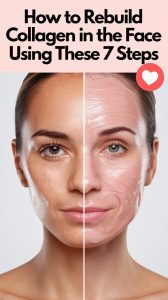Collagen is a vital protein that provides structure, elasticity, and strength to your skin. As we age, our bodies produce less collagen, leading to wrinkles, sagging skin, and a loss of firmness. Fortunately, there are several effective ways to boost collagen production and rejuvenate your skin. Here are seven steps to help you rebuild collagen in your face and achieve a youthful, radiant appearance.

1. Incorporate Collagen-Rich Foods into Your Diet
Your diet plays a crucial role in supporting collagen production. Eating foods that are rich in collagen and nutrients can help your body produce more of this essential protein.
- What to Eat: Include bone broth, fish (especially salmon), chicken, eggs, and dairy products in your meals. Foods high in vitamin C (like citrus fruits, strawberries, and bell peppers) and antioxidants (like berries and leafy greens) also support collagen synthesis.
2. Use Collagen Supplements
Collagen supplements, often available in powder, capsule, or liquid form, can provide a direct source of collagen to support skin health.
- How to Use: Look for hydrolyzed collagen peptides, which are easier for your body to absorb. Adding collagen powder to smoothies, coffee, or baked goods can help boost your daily intake.
3. Stay Hydrated
Proper hydration is essential for maintaining skin elasticity and overall health. Drinking enough water helps keep your skin plump and supports the body’s natural processes.
- Tip: Aim for at least 8 glasses of water a day. You can also consume hydrating foods, such as cucumbers, watermelon, and oranges, to boost your hydration levels.
4. Incorporate Vitamin C

Vitamin C is a powerhouse nutrient for collagen production. It helps stabilize collagen molecules and protects skin cells from damage.
- How to Use: Include vitamin C-rich foods like oranges, kiwi, guava, and broccoli in your diet. Additionally, consider using topical serums that contain vitamin C to enhance your skincare routine.
5. Protect Your Skin from Sun Damage
Excessive sun exposure can break down collagen and lead to premature aging. Protecting your skin from UV rays is essential for maintaining collagen levels.
- How to Protect: Use a broad-spectrum sunscreen with at least SPF 30 daily, even on cloudy days. Wearing protective clothing and seeking shade during peak sun hours can also help minimize damage.
6. Consider Retinoids
Retinoids, derivatives of vitamin A, are known to stimulate collagen production and improve skin texture. They promote cell turnover and can help reduce the appearance of fine lines and wrinkles.
- How to Use: Incorporate a retinol or prescription retinoid cream into your nighttime skincare routine. Start with a lower concentration to avoid irritation and gradually increase usage as your skin adjusts.
7. Maintain a Healthy Lifestyle

A healthy lifestyle supports overall skin health and collagen production. Avoiding smoking, limiting alcohol consumption, and managing stress can significantly impact your skin’s appearance.
- Tips for a Healthy Lifestyle: Engage in regular physical activity, prioritize sleep, and practice stress-reduction techniques such as yoga or meditation. A balanced diet rich in whole foods will also contribute to your skin’s vitality.
Final Thoughts
Rebuilding collagen in your face is achievable through a combination of dietary choices, supplements, skincare products, and a healthy lifestyle. By following these seven steps, you can enhance your skin’s elasticity, reduce the signs of aging, and achieve a youthful, glowing complexion. Remember, consistency is key—make these practices a regular part of your routine for the best results!

Pin It!
Want to rejuvenate your skin? Discover how to rebuild collagen in your face with these seven effective steps!
#CollagenBoost #HealthySkin #AntiAging #SkincareRoutine #BeautyTips #YouthfulGlow #SkinHealth #NaturalBeauty #SkincareGoals #GlowingSkin



